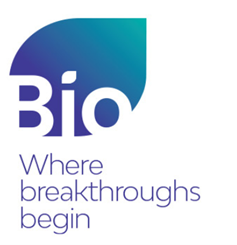Korean drugmakers said they had one-on-one partnering meetings with multinational pharmaceutical companies at the virtual Bio International Convention 2021 (BIO USA 2021) to develop their newest pipelines.
Due to the prolonged Covid-19 pandemic, the event took place in a virtual format, just like last year’s convention. The convention gathered 3,700 businesses and participants from more than 30 countries this year.

Among Korean participants, Genome & Company said it discussed the possibility of out-licensing its targeted immunotherapy GENA-104 with several multinational firms interested in the drug candidate's mechanism and the results of its test on animals.
Earlier in April, Genome & Company unveiled the new target CNTN4, which GENA-104 targets at the American Association for Cancer Research (AACR 2021). At the time, the company said GENA-104 demonstrated anticancer effects as an immune checkpoint inhibitor in animal models that expressed CNTN-4.
Genome & Company signed an agreement with Samsung BioLogics in December for a contract development organization (CDO) business for GENA-104 and developed cell lines and manufacturing processes. The drug candidate is in the non-clinical trial stage before applying for an investigational new drug (IND) trial.
The company said it would conduct a GLP toxicity test in the first quarter of 2022 and apply for IND by the first quarter of 2023. Also, the company is reviewing a combination therapy using immune-oncology microbiome-based treatment GEN-001.
Yoo Sung-yeol, head of the Business Development Group at Genome & Company, said the company would ensure that the latest partnering meeting can yield good outcomes.
“The company will further discuss technology transfer of GENA-104 and other pipelines and the schedule for due diligence,” he said.
PharmAbcine said global pharmaceutical companies showed interest in its first-in-class drug candidate PMC-403, which activates Tie2 receptors on endothelial cells to stabilize leaky blood vessels.
In May, PharmAbcine released the results of a non-clinical trial of PMC-403 that confirmed its mechanism of blood vessel normalization and efficacy on macular degeneration at the Association for Research in Vision and Ophthalmology (ARVO) 2021 Annual Meeting.
“Global pharmaceutical firms ranking within the top 10 were interested in PMC-403. However, the non-clinical results confirming the efficacy similar to that of Eylea (aflibercept) seemed to have surprised them,” an official at PharmAbcine said. “The discussions involved various indications including ophthalmology and kidney.”
PharmAbcine plans to complete the non-clinical toxicity test required for phase-1 IND application for PMC-403 within the year and move on to global clinical trials next year.
Last year, the company signed a joint research agreement with the U.S. National Institutes of Health (NIH). It was conducting a non-clinical evaluation of PMC-403 to treat systemic capillary leak syndrome (SCLS).
PharmAbcine’s new anticancer drug candidate, olinvacimab, also drew keen attention from Asian pharmaceutical firms, including Chinese ones, the company said. Jointly with MSD, PharmAbcine is testing olinvacimab in a phase-2 study.
Cellivery said it held meetings with 15 multinational firms at BIO USA 2021. In particular, the company met with Biogen and Eisai, the developers of Aduhelm (aducanumab), the world’s first FDA-approved treatment for Alzheimer’s disease.
With the two companies, Cellivery discussed applying its therapeutic molecule systemic delivery technology (TSDT), a drug delivery platform, to develop a new antibody treatment for degenerative brain disease.
“The two drug companies asked us whether the TSDT platform enables new drug delivery not only to brain tissues but inside of neuronal cells,” an official at Cellivery said.
Also, Cellivery discussed with a France-based pharmaceutical company over the technology transfer of iCP-Parkin to treat Parkinson’s disease and Alzheimer’s disease.
The French drugmaker requested an additional meeting for joint development of cell-permeable new drugs to treat rare diseases, Cellivery said.
Another global company based in Israel also requested an additional meeting on antibody targeting brain diseases, it added.
At BIO USA 2021, Ildong Pharmaceutical, focusing on securing its pipelines, also promoted new experimental treatments.
Through one-on-one partnering meetings, Ildong introduced pipelines including a type-2 diabetes drug candidate ID11014 with GPR40 (G protein-coupled receptor 40) mechanism; non-alcoholic steatohepatitis (NASH) drug with FXR (farnesoid X receptor) agonist mechanism; a new drug for wet macular degeneration (wAMD) with VEGF-A and NRP-1 dual-target mechanism; a dry eye disease treatment with cystic fibrosis transmembrane conductance regulator (CFTR) mechanism; and an acute respiratory distress syndrome (ARDS) drug candidate.
Ildong’s type-2 diabetes treatment candidate ID11014 is waiting for Europe’s approval for the phase-1 clinical trial, and Evotec is testing the NASH drug candidate ID11903 in a non-clinical study.
After partnering with a global CDMO late last year, Ildong is producing clinical samples of age-related wAMD treatment candidate ID13010
“An ARDS drug candidate ID11901 showed the efficacy of simultaneously suppressing oxygen supply and inflammation through nitric oxide production and PDE5 inhibition mechanism. So, we are anticipating a follow-up study,” an official at Ildong said.

